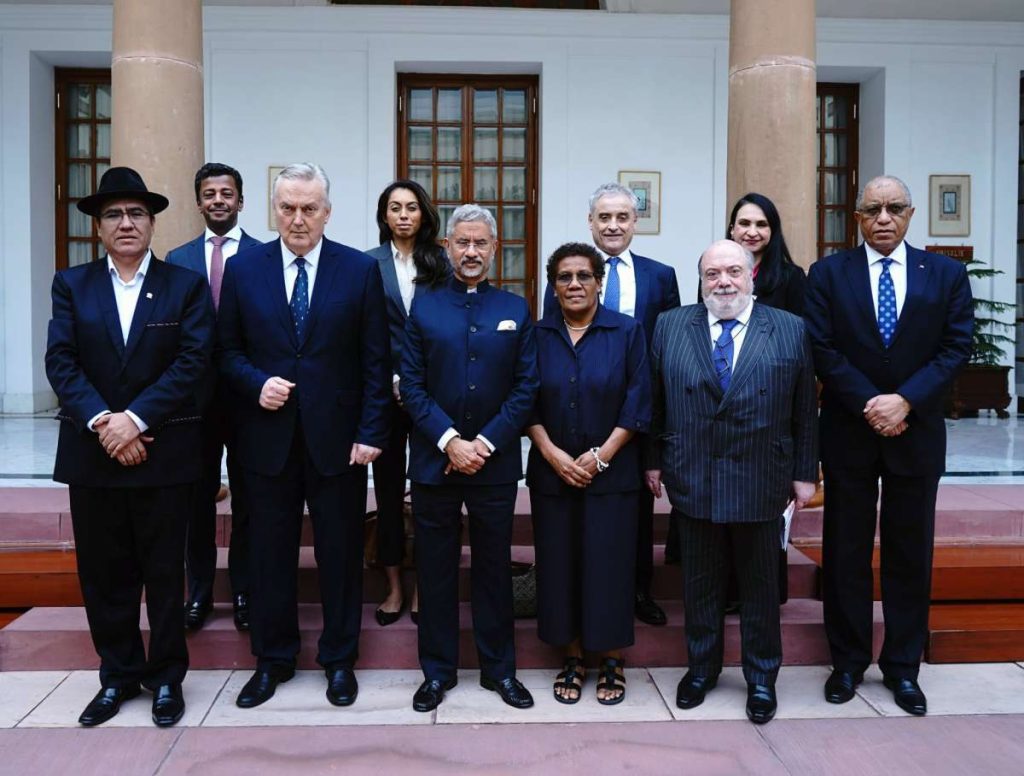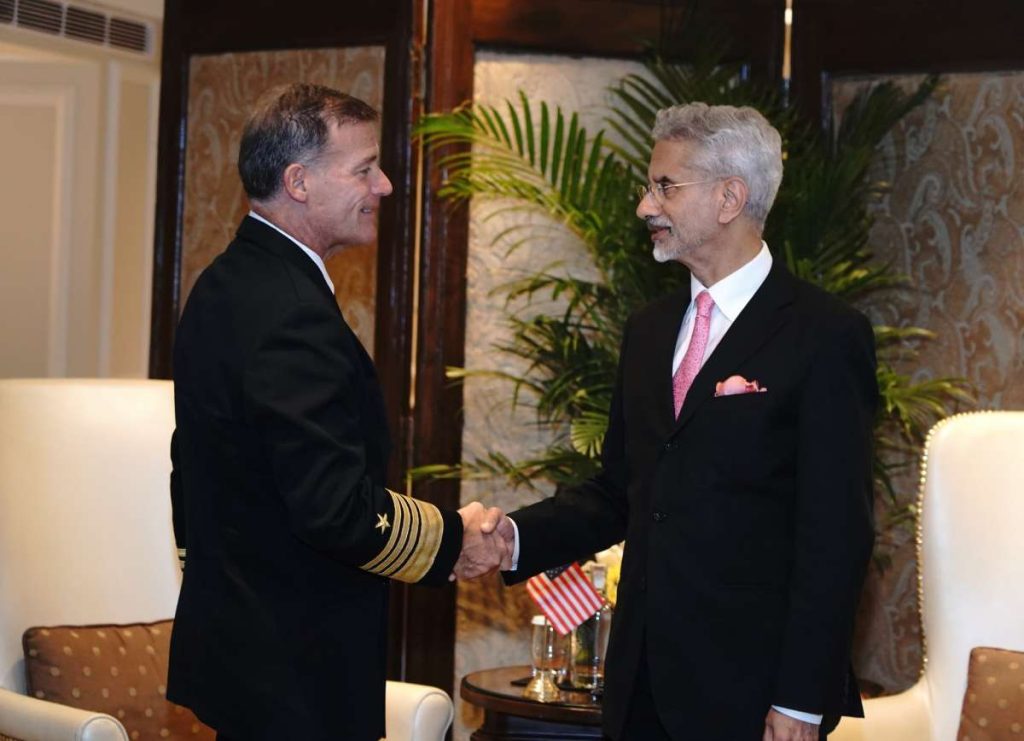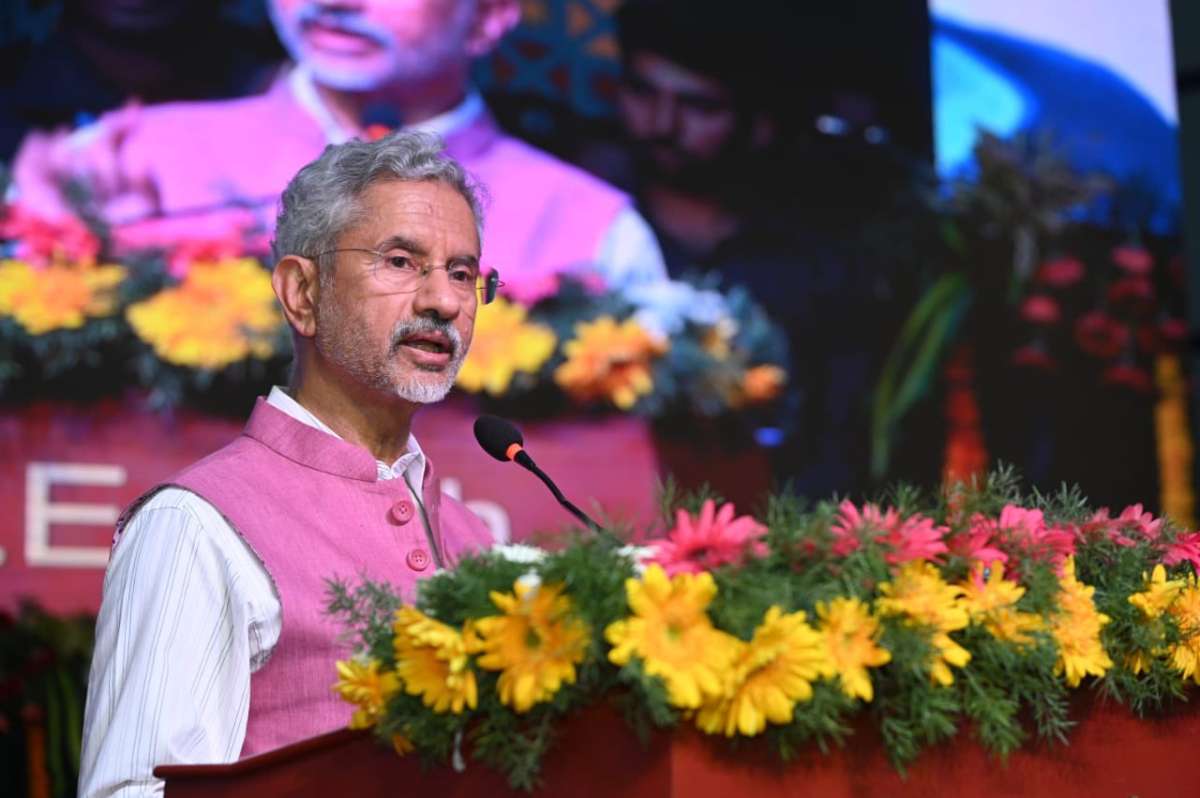India needs to transition towards a developed economy and a global leadership role, EAM Jaishankar says
India needs to move across a broad front of domains that all contribute to comprehensive national power, External Affairs Minister S Jaishankar has said while presenting a compelling vision for India’s role in tackling the pressing geoeconomic challenges of our time.
Addressing a distinguished audience of policymakers, experts, and students at the prestigious 8th Asia Economic Dialogue held in Pune in February, EAM Jaishankar said India needs to build deep national strengths that will drive the transition towards a developed economy and a leading power.

The Global Challenges Triad
EAM Jaishankar summed up the critical junctures at which the global economy finds itself today, driven by the complexities of supply chains, technological advancements, and the shadows of market dominance.
He outlined three predominant challenges that encapsulate the current geo-economic landscape.
The first challenge revolves around the global supply chain’s vulnerability, that arises from a particular economic hardwiring created by the globalization era. “Whether it is finished products, intermediates or components, the world is dangerously dependent on a limited number of suppliers,” he noted.
“How to introduce greater resilience and reliability is today central to de-risking the global economy,” he remarked.
The technology challenge stands as the second pillar, with the digital revolution transforming every facet of our lives, EAM Jaishankar stated. “The digital era has given it an altogether different connotation because it is so intrusive. It is not just our interests that are at stake but often the most personal of our decisions and choices. Such an era demands more trust and transparency,” he explained.
Lastly, he spoke about the challenge of market over-concentration and dominance, often heightened by unpredictability and opaqueness. “We discovered this most sharply during the Covid period. But from time to time, we are also reminded when market dominance is weaponized,” EAM Jaishankar pointed out.
He went on to say that this is particularly serious for the Global South, given the extent of dependence. The pandemic served as a stark reminder of these vulnerabilities, particularly affecting nations in the Global South with their significant reliance on global supply chains. This aspect underlines the urgency for a more equitable global market structure, EAM Jaishankar said.

Greater International Cooperation Needed
“There are no easy answers, nor indeed a limited number of them. To create a more safe, secure and cooperative world, we clearly need greater international cooperation,” EAM Jaishankar emphasized.
For India, this means moving across a broad front of domains that all contribute to comprehensive national power, he pointed out. “It requires a massive upgrade of our skills base. It suggests an environment that promotes skills and talent. It will benefit from easier to do business and a modern infrastructure. But most of all, it demands robust manufacturing that alone can provide the foundation for technology development,” he stated.
As the country positions itself to become the third-largest economy by the decade’s end, EAM Jaishankar emphasized that India’s goals and ambitions cannot be determined by the goodwill of others. “We must build deep national strengths during the Amrit Kaal that will drive the transition towards a developed economy and a leading power,” he asserted.
He reiterated the Modi government’s vision of leveraging the current era, termed as ‘Amrit Kaal,’ to transition towards a developed economy and a global leadership role.
The speech resonated particularly well in Pune, a city with a rich industrial legacy, where the audience was well-placed to appreciate the government’s ambitious initiatives and programs designed to catalyse India’s economic and technological ascent.
EAM Jaishankar’s address at the Asia Economic Dialogue 2024 not only highlighted the intricate web of geoeconomic challenges but also charted a course for India’s proactive engagement in shaping a resilient, secure, and cooperative global economic order. The journey ahead is fraught with complexities, but with strategic vision and international collaboration, a path to a more equitable and prosperous global economy is within reach.
Growth of Indo-Pacific strategy
Cooperation with South Korea in the Indo-Pacific region was one of the main highlights of External Affairs Minister (EAM) S. Jaishankar’s March 5-6 visit to the East Asian nation where he called for the country’s participation in the Indo-Pacific Oceans Initiative.
Acting on a gamut of challenges in the maritime domain, the initiative looks at a range of oceanic issues from ecology and environment to transport and science technology, widening the scope of the region’s narrative beyond traditional security and geopolitics.
It has been understood that EAM Jaishankar was referring to the Information Fusion Centre-Indian Ocean Region (IFC-IOR) which has established 67 linkages in 25 countries to promote collaboration for maritime safety and security.
And as EAM Jaishankar heads to Tokyo for the 16th India-Japan Foreign Ministers Strategic Dialogue, he is expected to exchange views on cooperation for a free, open, inclusive, peaceful, and prosperous Indo-Pacific with his counterpart, Yoko Kamikawa.
India and Japan also happen to be members of the Quad grouping along with Australia and the US which bats for a prosperous and resilient Indo-Pacific. Making its way as a leading power in this region, India reached out to Mauritius in the Indo-Pacific region and recently inaugurated an airstrip, jetty, and six other development projects.

With France, India continues to implement the Indo-Pacific Parks Partnership and the two nations are supporting a mangrove conservation initiative aimed at the Pacific States in particular.
The two sides have also agreed to work on finalising the India-France ‘Indo-Pacific Triangular Development Cooperation Fund’ to help people in the small island states.
In addition, the India-Middle East-Europe Economic Corridor (IMEC) launched at the G-20 summit last year, has been described as an alternative to China’s Belt and Road Initiative.
As per a Politico report, it has been hoped in the West that IMEC has the potential to limit Beijing’s rising geopolitical influence in the region.
Emerging as a result of global geopolitical shifts, the Indo-Pacific has been under increased focus for the past few years, and due to the swift-evolving dynamics, the region, as pointed out by EAM Jaishankar, requires “like-minded countries” to establish a stable regional security architecture.
Geopolitical experts feel that due to its sheer size, geographic location, and its ability to emerge as a strong global player post-pandemic, India’s role in the region cannot be overlooked.
“As the Indo-Pacific gains ascendancy, major regional players articulate their strategies for the region, it has become apparent that they are keen to engage with India and support the latter vision of a ‘free, open and inclusive’ Indo-Pacific,” according to an Indian Council of World Affairs report.
As a growing power in the region, India has said that instead of asserting itself in the Indian Ocean, it wants to play the role of a “Vishwa Mitra” (friend of the world) and create an environment of peace and prosperity in the region by ‘democratising’ it.
During his keynote address at the Indo-Pacific Regional Dialogue in Delhi in 2022, Defence Minister Rajnath Singh stated that India stands for a free, open, and rules-based Indo-Pacific as it is important for the economic development of not only the region but also the wider global community.
Also, the minister recently stated that the country will stand in support of its friendly nations in the Indo-Pacific region, thus ensuring that there is no kind of hegemony in the Indian Ocean.
ALSO READ: Didi buries Cong alliance hopes

